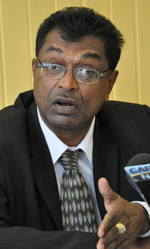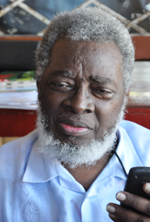
Khemraj Ramjattan

Dr Roger Luncheon
The Alliance For Change (AFC) said it has noted with amusement the alarm uttered by Cabinet Secretary, Dr Roger Luncheon regarding his reservation about the United States Agency for International Development (USAID) funded Leadership and Democracy Project.
In a statement, the AFC said any “effort which enhances democracy promotes, rather than undermines sovereignty and at a time when there has been no local government elections for over 14 years, and where the country is governed by a minority party which is continuously at war with the legislative arm of the state, any effort which improves the participation of a broader cross section of the population in the decision making process of the country is not only welcomed but necessary”.
Democracy
The party added: “The PPP/C [Peoples Peogressive Party/ Civic] government seems to have conveniently forgotten that it was none other than their founder leader, Dr Cheddi Jagan, who not only sought but insisted on the participation of former U. S. President Jimmy Carter in his efforts to enhance democracy in Guyana in 1992.”
The AFC said it is therefore perplexed by what circumstances might have changed since then that now categorises efforts at enhanced democracy as a challenge to sovereignty.
“But what could be the justification in not wanting to support a project as this which has increased participation of the citizenry in democracy building, consensus building in the National Assembly, funding for research and legal drafting skills for Parliamentarians, women and youth civic education festivals, and local government education and awareness? It could only be the downgrading of participatory democracy and the abandoning of a once loudly heralded PPP/ C’s goal ‘No development without democracy’”.
According to the AFC, this newfound political approach of confrontational diplomacy and harsh assailing of a most senior ranking diplomat from U. S., is a retrograde step towards full fledged authoritarianism.
“All Guyanese and perhaps equally importantly, the members in the Guyanese diaspora in the U. S. A, must speak out against this unacceptable stance adopted by the government. AFC supports the position taken by the U. S. government and looks forward to the positive contribution this project will provide to enhanced leadership and democracy in Guyana. The AFC endorses this project,” the statement said.
Repercussions
The government last week warned that there could be serious repercussions over the U.S. government’s insistence on carrying out the USAID project, which the Donald Ramotar administration has rejected.
The government has also written the U.S. ambassador to Guyana, D Brent Hardt on comments he made in an exclusive interview with the Stabroek News recently, insisting that the project would go ahead with or without the Guyana government’s support.
Dr Luncheon told a news conference on Tuesday that the administration will view Ambassador Hardt’s response as the official reaction of Washington.
In a letter to the editor of this newspaper, Dr Luncheon said he noted the ambassador, reportedly stating the U. S. intention to implement the project notwithstanding Cabinet’s disapproval. He said he has also noted the insistence of the ambassador that the government of Guyana was consulted on the project.
“I have also noted the political opposition supporting the U.S. ambassador’s line that the government had no good reason to reject the project.
“Mister Editor, at this stage, the issue is the U.S. ambassador’s apparent contempt of the Cabinet of Guyana – an act that can have serious repercussions,” Dr Luncheon warned.
The Cabinet secretary said Hardt was playing with words with regards to consultation.
“I still contend Guyana was not consulted. The project was conceived by the American authorities, the project was funded by Congress,” he said.
A bid was then tendered, and the U. S. organisation International Republican Institute (IRI) won that bid and was awarded the contract to implement the project.
According to Dr Luncheon, it was subsequent to those actions by the American authorities that the U. S. ambassador approached the government of Guyana.
“I challenge the ambassador to indicate at what point was the government of Guyana consulted about this project. The U.S. ambassador presented the government with a fait accompli.”
Dr Luncheon further stated that Hardt’s apparent contempt of the Guyana government begs the question and supports “our contention that the ambassador is of the opinion that the U.S. authorities can execute projects in Guyana at will. This is a dangerous proposition that all right-thinking Guyanese and indeed sovereign states must repudiate,” Luncheon added.



